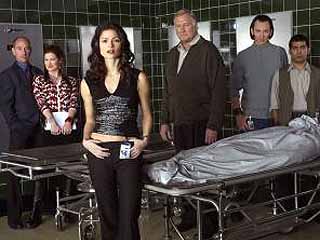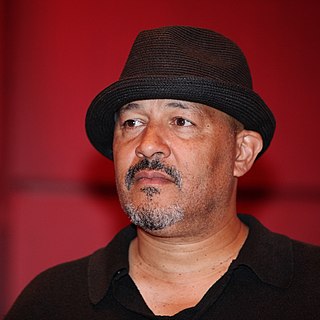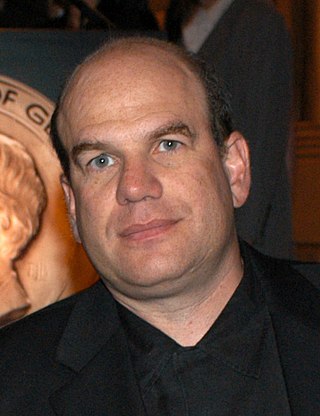Related Research Articles

Law & Order: Special Victims Unit is an American police procedural crime drama television series created by Dick Wolf for NBC. The first spin-off of Law & Order, it stars Mariska Hargitay as Detective Olivia Benson, now the commanding officer of the Special Victims Unit after originally having been Stabler's partner in a fictionalized version of the New York City Police Department, and Christopher Meloni as Detective Elliot Stabler. Law & Order: Special Victims Unit follows the detectives of the Special Victims Unit as they investigate and prosecute sexually based crimes. Some of the episodes are loosely based on real crimes that have received media attention.

Police Story is an American anthology crime drama television series that aired weekly on NBC from September 25, 1973, through April 5, 1977, followed by a season of irregularly scheduled television film specials from September 27, 1977, to May 28, 1978, with three further television films screened in 1979, 1980, and 1987. The show was created by author and former police officer Joseph Wambaugh and was described by The Complete Directory of Prime Time Network and Cable TV Shows as "one of the more realistic police series to be seen on television". It was produced by David Gerber and Mel Swope.

Crossing Jordan is an American crime drama television series created by Tim Kring, that aired on NBC from September 24, 2001, to May 16, 2007. It stars Jill Hennessy as Dr. Jordan Cavanaugh, a crime-solving forensic pathologist employed in the Massachusetts Office of the Chief Medical Examiner. In addition to Jordan, the show followed an ensemble cast composed of Jordan's co-workers and police detectives assigned to the various cases.
Homicide: Life on the Street is an American police drama television series chronicling the work of a fictional version of the Baltimore Police Department's Homicide Unit. It ran for seven seasons and 122 episodes on NBC from January 31, 1993, to May 21, 1999, and was succeeded by Homicide: The Movie (2000), which served as the series finale. The series was created by Paul Attanasio and based on David Simon's book Homicide: A Year on the Killing Streets (1991). Many of the characters and stories used throughout the show were based on events depicted in the book.
Monk is an American police procedural comedy drama detective television series that originally ran on the USA Network from July 12, 2002, to December 4, 2009, with 125 episodes broadcast over eight seasons. It follows Adrian Monk, a private detective with obsessive–compulsive disorder and multiple phobias, and his assistants Sharona Fleming and Natalie Teeger. Monk works with the San Francisco Police Department in solving unconventional cases while investigating his wife's unsolved murder. The show also explores the main characters' personal lives and struggles.

Clark Johnson is an American-Canadian actor and director who has worked in both television and film. He is best known for his roles as David Jefferson in Night Heat (1985–1988), Clark Roberts in E.N.G. (1989–1994), Meldrick Lewis in Homicide: Life on the Street (1993–1999) and Augustus Haynes in The Wire (2008). He is an Emmy Award and two-time Genie Award nominee.

David Judah Simon is an American author, journalist, screenwriter, and producer best known for his work on The Wire (2002–08).
John Munch is a fictional character played by actor Richard Belzer. Munch first appeared on the American crime drama television series Homicide: Life on the Street on NBC. A regular through the entire run of the series from 1993 to 1999, Munch is a cynical detective in the Baltimore Police Department's Homicide unit, and a firm believer in conspiracy theories. He is originally partnered with Detective Stanley Bolander. Munch is based on Jay Landsman, a central figure in David Simon's 1991 true crime book Homicide: A Year on the Killing Streets.

The first season of Homicide: Life on the Street, an American police procedural drama television series, originally aired in the United States on NBC between January 31 and March 31, 1993. The show was created by Paul Attanasio, with film director Barry Levinson and television writer and producer Tom Fontana serving as executive producers. Adapted from David Simon's 1991 non-fiction book Homicide: A Year on the Killing Streets, the season followed the fictional detectives of Baltimore Police Department homicide unit and the murder cases they investigate. The show was broadcast on Wednesdays at 9 p.m. EST, with the exception of the series premiere, which aired immediately after Super Bowl XXVII.
Charles W. Jensen is a retired captain of the Portland Police Bureau in the U.S. state of Oregon. Jensen was also a regular on the Fox television series World's Wildest Police Videos. He also appeared on other police-related programs, including American Detective and World's Scariest Police Chases, which first aired in 1991 and 1997 respectively.

The second season of Homicide: Life on the Street, an American police procedural drama television series, originally aired in the United States between January 6 and January 27, 1994. Due to low Nielsen ratings during the first season, NBC executives decided to order only a four-episode season, after which they would evaluate the ratings and decide whether to renew the show. Homicide was moved to a new timeslot of Thursdays at 10 p.m. EST, temporarily replacing the legal drama L.A. Law. NBC requested several changes from the series, including fewer episode subplots and less camera movements and jump cuts.

The third season of Homicide: Life on the Street aired in the United States on the NBC television network from October 14, 1994, to May 5, 1995, and contained 20 episodes. It was the first full season of episodes. Beginning in the third season, Homicide was moved to Fridays at 10 p.m. EST, a timeslot the show would remain at until its cancellation in 1999.
Joy Lusco, also known as Joy Kecken and Joy Lusco Kecken, is an American film and television director and writer. She often works with her husband, Scott Kecken. They worked on the HBO drama series The Wire on four of the show's five seasons.
James Yoshimura is an American writer and producer, best known for his screenwriting work on the NBC series Homicide: Life on the Street and the short-lived Fox series The Jury, for which he served as a co-creator. He also co-wrote Homicide: The Movie, a made-for-television film that came out in 2000, after the series ended. Yoshimura has received two Emmy Award nominations: one for Homicide: The Movie and one for the Homicide episode "Subway", which also won a Peabody Award for excellence in television broadcasting.

"Three Men and Adena" is the fifth episode of the first season of the American police drama television series Homicide: Life on the Street. It originally aired on NBC in the United States on March 3, 1993. The episode was written by executive producer Tom Fontana and directed by Martin Campbell. In the episode, Pembleton and Bayliss have a 12-hour limit to elicit a confession from Risley Tucker for the murder of 11-year-old Adena Watson. The episode takes place almost entirely within the confines of the police interrogation room with the three actors.
"Ghost of a Chance" is the second episode of the first season of the American police drama television series Homicide: Life on the Street. It originally aired on NBC in the United States on February 3, 1993. The teleplay was written Noel Behn based on a story by executive producer Tom Fontana, and the episode was directed by Martin Campbell. In it Bayliss begins his investigation into the murder of 11-year-old Adena Watson, Munch and Bolander investigate the unusual death of an elderly man, and Howard insists she is receiving advice about her murder case from a ghost.

"Night of the Dead Living" is the ninth episode and first season finale of the American police drama television series Homicide: Life on the Street. It originally aired on NBC in the United States on March 31, 1993. In the episode, the homicide squad works the night shift on a summer evening, but no calls come in, leaving the detectives to brood over their personal matters. The teleplay was written by Frank Pugliese based on a story he wrote along with executive producer Tom Fontana. It was directed by Michael Lehmann.

"A Many Splendored Thing" is the second season finale of the American police drama television series Homicide: Life on the Street, and the thirteenth overall episode of the series. It originally aired on NBC in the United States on January 27, 1994. In the episode, Pembleton and Bayliss investigate the S&M-related murder of a young woman, which forces an uncomfortable Bayliss to confront his darker side. Meanwhile, Lewis is disturbed when a man commits murder over a $1.49 pen, and a despairing Munch crashes Bolander's date and ruins it by venting his own romantic woes.
Jorge Zamacona is an American television writer and producer. He worked extensively on the police drama Homicide: Life on the Street and wrote the series' crossover episodes with the crime drama Law & Order. Zamacona co-created the police dramas 10-8: Officers on Duty and Wanted.
"Nearer My God to Thee" is the third season premiere of the American police drama television series Homicide: Life on the Street, and the fourteenth overall episode of the series. It originally aired on NBC in the United States on October 14, 1994. In the episode, the homicide department is assigned to the politically volatile murder of a beloved social worker, whose body is found wearing nothing but a pair of white gloves. Meanwhile, Felton struggles with marital problems, while Lewis and Munch try to find a business partner with whom to open a bar.
References
- ↑ Craig, Jeff (1997-02-23). "Homicide's second shift on net". Canoe.ca . Archived from the original on July 11, 2012. Retrieved 2007-09-27.
{{cite news}}: CS1 maint: unfit URL (link) - ↑ Zurawik, David (1999-02-05). "'Homicide' in cyberspace". Baltimore Sun .
- ↑ Wolk, Josh (1999-02-05). "Life on the Web. 'Homicide' welcomes its website cast to the show -- a first step in NBC's plans to nab TV defectors". Entertainment Weekly . Retrieved 2007-09-27.